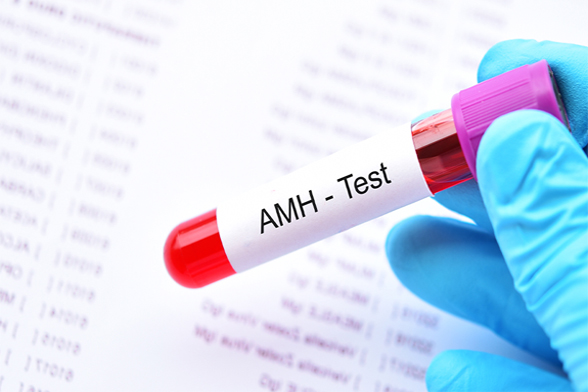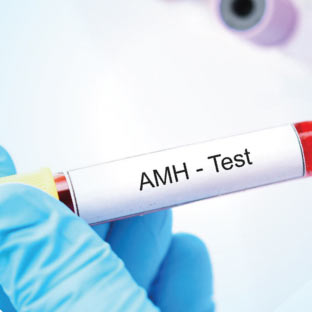Two primary measures used to assess fertility reserve are Anti-Müllerian Hormone (AMH) levels and Antral Follicle Count (AFC).
Fertility Reserve in Women
A woman's fertility reserve refers to the number of eggs in her ovaries. We all know, this number declines with age and more rapidly after 35-37 years. This reserve is the best indicator for success of any fertility treatment, especially IVF.

AMH: What Is It and What Do The Levels Indicate?
Anti-Müllerian Hormone (AMH) is a hormone produced by the small follicles (antral follicles 5-10mm in size) in a woman’s ovaries. It serves as a key marker for ovarian reserve, indicating the remaining quantity of eggs. Unlike other hormones, AMH levels remain relatively stable throughout the menstrual cycle, so it does not have to be tested only at a certain time in your menstrual cycle (e.g. FSH/LH have to be tested between 2nd and 4th day of the period). Higher AMH levels suggest a greater number of eggs, which is generally a positive sign for fertility outcome. Conversely, low AMH levels may indicate diminished ovarian reserve (fewer eggs in the ovaries).
While AMH levels can provide valuable information about a woman’s fertility potential, it’s important to remember that they do not predict egg quality, which is also a critical factor in successful conception. For women considering fertility treatments or those planning to delay pregnancy, AMH testing can be a good tool for making informed decisions.
Antral Follicle Count (AFC) and what that means
Antral Follicle Count (AFC) is another important measure of fertility reserve, typically assessed through a transvaginal ultrasound.
This test counts the small (5-10mm diameter), fluid-filled sacs (antral follicles) within the ovaries that contain immature eggs. The number of antral follicles visible during the early phase of the menstrual cycle provides a direct indication of a woman’s ovarian reserve. A higher AFC suggests a better fertility outlook, as it suggests a greater number of eggs available in the ovary. Conversely, a low AFC may point to a reduced ovarian reserve, which can make conception a bit challenging.
AFC is often used alongside AMH testing to provide a comprehensive picture of a woman’s fertility, helping to guide treatment options such as IVF or egg freezing.
PCOS and Its Impact on AMH and AFC
Polycystic Ovary Syndrome (PCOS) is a common hormonal disorder and women with PCOS often have elevated levels of Anti-Müllerian Hormone (AMH) due to an increased number of small follicles in the ovaries. This can make AMH levels higher than normal, even though the quality of the eggs may not be optimal.
Similarly, Antral Follicle Count (AFC) is typically higher in women with PCOS because of the presence of multiple small follicles that often fail to mature properly.
While high AMH and AFC levels usually suggest a good ovarian reserve, if you have PCOS, it can complicate the picture and even the treatment. E.g. Women with PCOS have a much higher risk of having OHSS (Ovarian Hyperstimulation Syndrome) and may need a “split cycle” (freeze all embryos and put them back (FET) later).
In Conclusion
Understanding fertility reserve through measures like AMH levels and AFC is helpful for women planning their reproductive future. These tests provide insights into the quantity of eggs remaining, helping to guide treatment choices. Judging fertility reserve is however, a complex science and it’s important to discuss this with our expert clinicians and understand it’s nuances.
At Acorn Fertility, we’re here to help you navigate this journey with personalized care and expert guidance.
How do we help women with low Fertility reserve?
- Working with nutritionists and other healthcare specialists to optimise your overall health so that you make the most of the ovarian reserve you have.
- Discussing with you your choices of treatment and if IVF, the type of IVF protocols (conventional or Mild IVF) to see what suits you best.
- Offering the option of embryo biopsy to be done after a series of IVF cycles to collect the right number of embryos. Acorn Fertility is currently not licensed to do embryo biopsies, however we work in close association with IVF London to be able to offer this service. Please discuss this with our team to know more
- In women with PCOS we offer a comprehensive plan of treatment to take into account the possible need for a “split cycle” so that there are no surprises midway (especially cost-wise).

Get Free Initial Telephonic Consultation, Call +44 20 7569 3000
Fees are an estimate only and may be more depending on your situation
- GET FREE TELEPHONIC CONSULTATION
